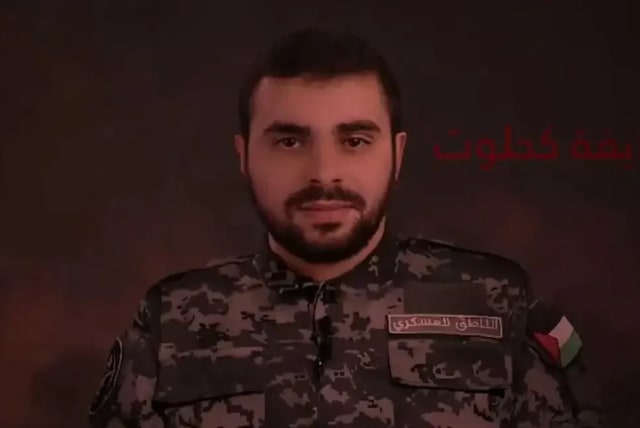Why does Hamas's spokesperson have asymmetrical eyes? IDF investigates

In a recent video featuring Abu Obaida, the spokesperson for Hamas, his eyes appear asymmetrical. The IDF explains why.
In a recent video shared by Hamas, the terrorist group's spokesperson, Abu Obaida, appears to have asymmetrical eyes.
Questions have arisen within the IDF regarding the cause of this abnormality, as it remains unclear whether he was wounded during an airstrike. Furthermore, the spokesperson's reduced activity has drawn attention.
Abu Obaida recently shared a video denouncing Israel. The IDF noted a distinct difference in the size of Abu Obaida's eyes, even though he attempted to conceal it by wearing a hoodie.
A military source elaborated, stating, "Anyone who closely follows him could see the change that occurred in his eye. It is larger than the other, and this isn't normal."
It is speculated that he may have been injured, and is suffering from inflammation without proper treatment as a result of IDF attacks. His recent decrease in activity has further piqued the IDF's curiosity.
Why is Hamas's spokesperson so dangerous?
As the spokesperson for Hamas's military wing, Abu Obaida has become a subject of discussion within the security and intelligence community. A senior security official expressed concern, stating, "The Israeli security establishment has allowed Abu Obaida, along with other senior Hamas figures, to grow, develop, and cause damage to Israel, instead of neutralizing him." The official emphasized the significant threat Abu Obaida poses.
The intelligence community recognizes Abu Obaida's role in manipulating individuals who disseminate false propaganda against Israel. He employs sophisticated psychological warfare tactics that impact Israeli society, often focusing on contentious issues such as Israeli hostages.
Furthermore, he exploits traditional Western media and social networks to spread lies, fear, and intimidation. He is responsible for capturing and publicizing attacks on the Israeli border, documenting and sharing horrific acts of brutality on social media platforms.
Meanwhile, criticism has emerged within the security establishment regarding the media and political involvement surrounding Qatar's delivery of medication to Hamas's military wing and the Israeli hostages in the Gaza Strip, as per a deal struck between Israel and Hamas.
A senior source expressed doubt, stating, "Due to the unclear mechanism of medication delivery and verifying its distribution to the hostages desperately in need, I personally did not participate. It remains uncertain what evidence Hamas and the Qataris will provide to prove that the drugs indeed reached their intended recipients."
Jerusalem Post Store
`; document.getElementById("linkPremium").innerHTML = cont; var divWithLink = document.getElementById("premium-link"); if (divWithLink !== null && divWithLink !== 'undefined') { divWithLink.style.border = "solid 1px #cb0f3e"; divWithLink.style.textAlign = "center"; divWithLink.style.marginBottom = "15px"; divWithLink.style.marginTop = "15px"; divWithLink.style.width = "100%"; divWithLink.style.backgroundColor = "#122952"; divWithLink.style.color = "#ffffff"; divWithLink.style.lineHeight = "1.5"; } } (function (v, i) { });


